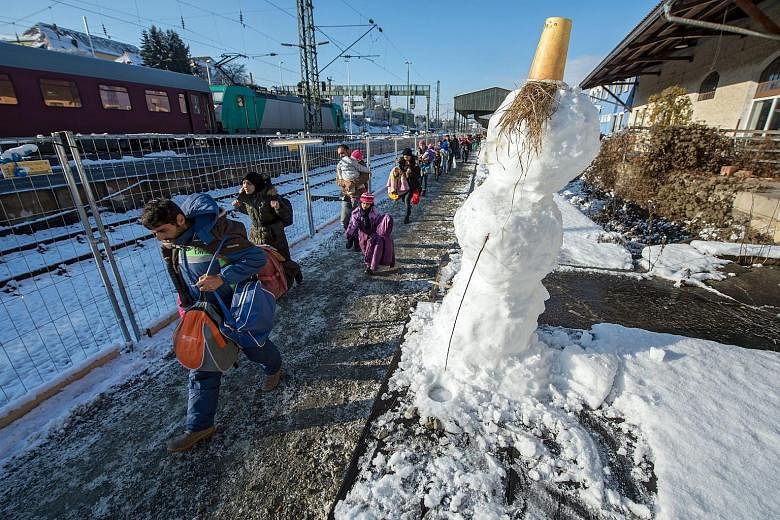The European Union's most senior official has warned that unless the continent urgently comes to grips with its migrant crisis, the entire arrangement which allows people to travel freely between European countries will collapse, and the 28-nation bloc would "fail as a political project".
"We have not more than two months to get things under control," Mr Donald Tusk, a former prime minister of Poland who now chairs the heads of states and governments of the EU, told European lawmakers on Tuesday.
His warning found an immediate echo among Members of Parliament in Germany, the EU's biggest member, with 44 legislators from the ruling party calling on Chancellor Angela Merkel to adhere to the "strict interpretation of existing laws" by closing the country's borders to new asylum seekers.
Yet there are no indications that European governments are anywhere near reaching a consensus about what needs to be done to police their frontiers and reassure their people that the large inflow of migrants is being controlled.
The EU is struggling to cope with more than 1.1 million refugees - the majority of whom have applied for asylum in Germany - who entered the bloc's borders last year. Many of them are from war-torn Syria.
However, a growing proportion of new arrivals is from countries where there is no war, such as Morocco, Algeria or even more-distant Pakistan. That serves as an indication that the migratory pressures facing Europe are not just temporary but also represent a sustained, long-term challenge.
The current winter is making it difficult for illegal migrants to come to Europe, with most of the land and sea routes they use too treacherous now. Still, around 3,000 new asylum seekers continue to be registered each day across Europe. With the onset of spring just a month away, officials worry that the figures could soar again to the 10,000 daily levels registered at the height of the migration crisis last year.
However, most of the measures to alleviate migration pressures already agreed between EU member states have not been implemented. A controversial plan to provide for greater burden-sharing by relocating 160,000 asylum seekers across the continent has only succeeded in redistributing 322 migrants by this week.
An EU plan to provide major transit point Turkey with €3 billion (S$4.7 billion) in aid in exchange for a commitment to stem the flow of migrants is being blocked by Italy, as part of a broader tussle over subsidies. Efforts to adopt a common legal definition of who may be entitled to seek asylum in Europe have also failed.
The result is that each EU country is adopting its own measures to deal with the problem. Germany this week announced that it will accelerate the deportation of migrants who have been denied asylum status. Currently, deportations are rarely carried out, with government statistics showing that last year, out of 300,000 people whose asylum applications were rejected, only 18,000 were actually removed from Germany.
The German authorities are now prepared to brave historic sensitivities by establishing special holding camps for those designated for deportation; that would at least remove migrants from the streets.
Meanwhile, neighbouring Austria has reintroduced passport controls at its frontiers with the aim of stemming the flow. "Anyone who arrives at our border is now subject to control," Chancellor Werner Faymann said this week.
And Slovenia, the small south-eastern European state which is another major transit point for migrants, intends to follow suit. "We won't be the entry point to the European Union," vowed Prime Minister Miro Cerar on Monday.
Desperate to maintain open borders between member states, something which is regarded as one of Europe's biggest historic achievements, EU officials are scrambling to persuade countries to agree on a common approach towards restricting migration flows.
Yet European leaders remain better at rejecting new approaches than at agreeing on what can be done. Germany's influential Finance Minister Wolfgang Schaeuble proposed this week the creation of a border police force for the entire bloc, to be funded through a new EU-wide tax on petrol sales.
"No," was the resounding answer from most other governments.


